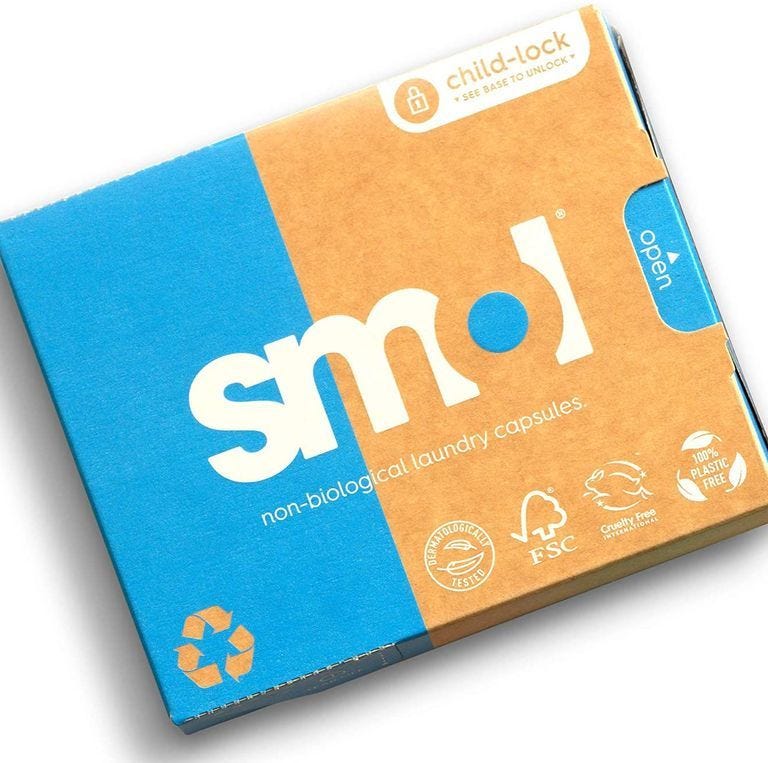"I run my washing machine at least once a day, sometimes twice or if not three times". I was shocked when my sister admitted this to me. Although I can’t judge; she has two young children running around so mess is a given. But, it got me thinking, are we using our washing machines too often?
New research from Chalmers University of Technology found that consumers are more likely to be driven by their disgust than their concern for the environment when it comes to laundry. That means there’s a lot more washing going on than there needs to be, which takes a toll on the environment.
To make matters worse, according to Ecover’s ‘Home ECOnomics Report,’ 11% feel pressured by society to wash their laundry more frequently; despite being conscious of their carbon footprint. Meanwhile, the same report shows that 18% believe that running fewer cycles won't have an impact on the planet, so there’s a general lack of understanding here too.
So how bad really is it? We’ve broken down the consequences of over-washing, including what it means for energy and water consumption, as well as microplastics and pollution. Want to steer clear of this habit? We’ve also pulled together a comprehensive washing guide, so you know where to take breaks on laundry day.
The impact of over-washing
Looking at how often we choose to wash our clothes, most of us are driven by the number of wears to keep things simple. Even if there’s no obvious stains or smells, if we’ve worn it a set number of times, we will more likely wash it through fear of others judging. That’s quite surprising considering how sustainable we try to be these days.
The trouble with this habit is it’s not good news for the environment. With every wash cycle our washing machines are consuming energy and water and potentially releasing microplastics into the environment. And then there’s the additional manufacturing process of our detergents to consider too.
To put the cost of additional cycles into perspective, our winning washing machine (the Samsung Series 8 AI Energy WW11DB8B95GHU1) consumes 1.34 kWh (or 33p) and 112.67 litres of water on average to run a 40°C cotton cycle. So, if you were to run an additional three cycles a week, over a year that would equate to 209.04 kWh (£51.21) and 17,576.52 litres of water.
Of course, you shouldn’t be cutting back on cycles by overloading your washing machine, but you shouldn’t be running it while emptier than necessary either. Aim to fill it around ¾ full to get the best performance and to make the most of the wash.
What not to do with your washing machine
13 THINGS YOU SHOULD NEVER WASH IN THE WASHING MACHINE
7 BAD HABITS TO BREAK WITH YOUR WASHING MACHINE
5 THINGS YOU NEED TO KNOW IF YOU ALWAYS USE THE QUICK WASH
According to Electrolux, as much as 700,000 microfibres are released from a single load of laundry. The abrasiveness of the cycle and detergent removes the fibres from synthetic clothing, which are then drained away with the water. These can damage aquatic life, potentially being ingested by small marine creatures down the line.
And that’s not all, according to Ecover’s same report, 24% of adults aren’t confident in reading and understanding the care label, which gives us the recommended washing settings and process. 34% ignore these instructions entirely. That means we’re not only potentially running more washes than needed; some are using a hotter cycle than necessary, wasting energy as well as likely damaging their clothes in the process.
So it’s clear that we need to change our way of thinking when it comes to the washing machine. That means not necessarily chucking items into the laundry bin just because they've been worn or making guesswork of the care label. We need to start seeing the washing machine as something to use only when necessary, and that means potentially wearing our clothes for longer than we’re used to.
How often should you wash your clothes?
Here at GH, we’ve got guides on how often you should be washing your clothes to take the guesswork out. Follow these rules and it will help your clothes last longer while still smelling fresh. It will be good news for your washing machine too as it won’t have to work so hard!
Underwear – It’s essential that you wash your underwear between uses, so do not try to extend the wear here! They’re an ideal environment for bacteria to grow, and can contribute to diseases, such as urinary tract infections and thrush, if not kept clean.
Bras – Your bra should be worn three to four times before being laundered. Resist the urge to wash between uses as this will ruin the shape and elasticity over time. Washing by hand is better for your bras compared to using the washing machine, but we appreciate this isn’t always convenient. If you must use the washing machine, use a mesh laundry bag to protect your bra and wash on a gentle cycle at the highest temp allowed by the care label. Hang dry from the centre between the cups, rather than from the straps.
T-shirts – T-shirts make direct contact with your skin, so these should be washed between uses too. They can collect sweat with each wear, and once bacteria makes contact that’s when things start to smell. Items worn over the top which don’t make contact will last for longer between washes though.
Jeans – Jeans are frequently over-washed which will damage the material and shape. Stick to washing these after 10 wears or so to keep them looking good. Remember to turn them inside out and zip them up before washing, so they don’t snag on delicate items.
Pyjamas – We sweat a lot at night and pyjamas will take the brunt of that. Wash after every three wears, or extend these to once a week in the cooler months.
Bedsheets – Keep your bedsheets smelling fresh by not making the bed in the mornings – you read that right! Pull the duvet off the bed and leave the windows open to vent any residual moisture for a few hours. You should ideally wash your sheets at least once a fortnight to keep them fresh.
Gym Kit – Unsurprisingly, your gym kit should be washed as soon as possible after each session. That’s because we sweat a lot while working out, and you don’t want to give bacteria a chance to multiply. Wash using a detergent suited to sportswear, such as Clothes Doctor No. 5 Eco Wash for Sportswear. Avoid using fabric softener as this deters the material’s moisture-wicking abilities.
Towels – Your bath towels need washing every 3-4 uses, but make sure you spread them out fully in a well-ventilated space as they air dry; this prevents musty smells. If you’ve used a towel up the gym, wash it as soon as you’re home because this likely will be covered with sweat and bacteria.
Coats and jackets – With daily wear, your winter coats should be washed one-two times per season. This is necessary because the continued exposure to rainwater can encourage musty smells. Dirt can also be transferred onto this item where we’ve leaned or sat down in our coats from day-to-day. Wash in the machine on the delicate cycle with cold water and non-bio detergent if the care label allows (this can be the case for down, puffa and parka jackets). We recommend a wool cycle at 30 degrees with a detergent suited for wool for machine-washable faux-fur or faux-shearling (always turn these inside out first). Otherwise, if professional cleaning is recommended, that’s what you should do.


















